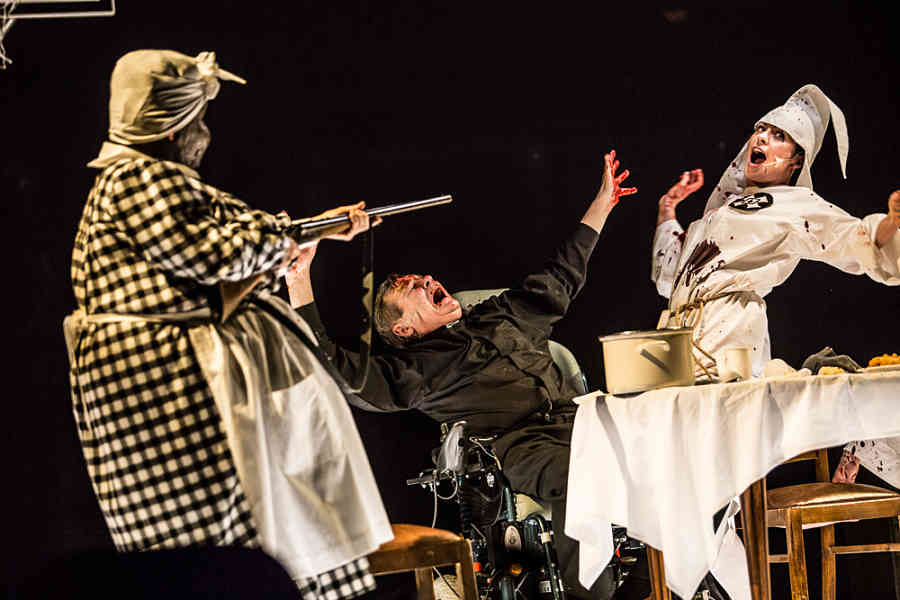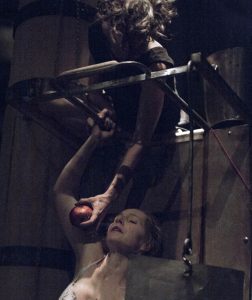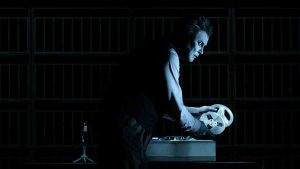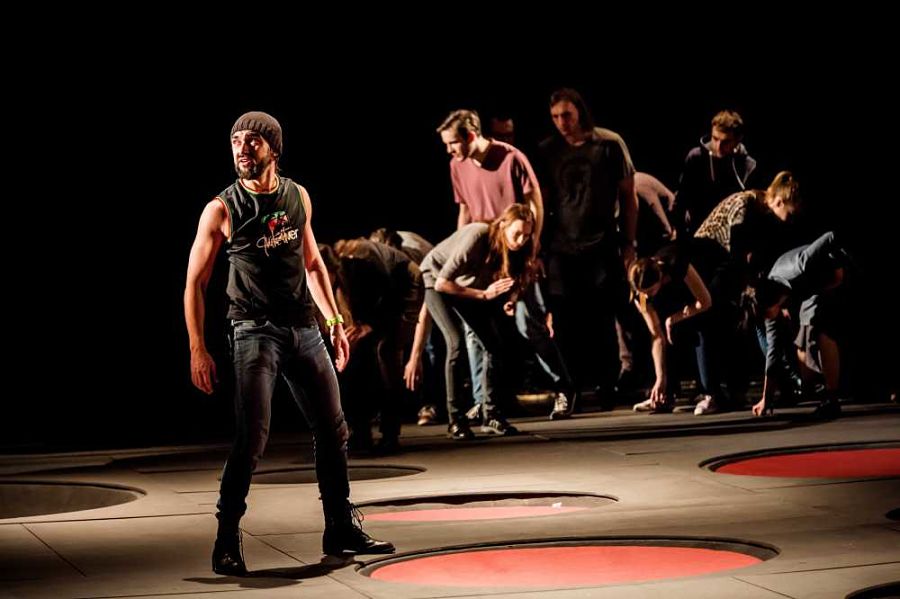The terrible night is coming. Close the door and padlock it. Hold aloft the torches. Place the kettle filled with vodka in the middle of the room and on the signal of my walking stick, let the vodka catch fire.
The kettle boils, then bursts. Darkness and dullness are all around.
What will happen now? What will happen now?
— A scene from Forefathers’ Eve, Part 2 (1823)
Citizens of Poland and citizens of the United States find themselves contending with a lot of the same problems these days, particularly political ones. Low-turnout elections in both countries have in recent months swept populist right-wing administrations into power—Trump and company in the U.S., the Law and Justice party (abbreviated PiS) in Poland—creating unprecedented factionalism and fears about the breakdown of democracy. And in both countries, theatre has joined the ensuing national conversation in provocative, open-ended ways.
At the apex of American theatre, Broadway, Lin-Manuel Miranda’s landmark musical Hamilton is retelling the founding story of the U.S. with a freshly celebratory perspective, one that transmogrifies the dark strains of racism in American history into a new template for tolerance and inclusion. Who knew, until the country’s newly elected vice-president-to-be showed up in November for the Hamilton experience (and a pointed post-show shout-out), just how pertinent to the nation’s raging political debate the show’s lessons about unity versus divisiveness would become?
As a media flashpoint in the brouhaha over Trump’s presidency, Hamilton and its widely touted foray into national self-examination onstage gained new currency and attention. But an equally rich if far more complex version of theatrical identity formation took root in Poland a century-plus ago, via a very different dramatic property: Adam Mickiewicz’s 19th-century Romantic verse epic Dziady—the title refers to an ancient Slavic feast commemorating the dead, and translates as Forefathers’ Eve—which has been regularly presented on Polish stages since 1901.
While only a thin slice of the U.S. populace has copped Hamilton tickets, virtually every Polish citizen has his or her relationship to Forefathers’ Eve, which is taught in schools and has entered the nation’s collective consciousness in a way that is difficult to overstate. Despite its esoteric qualities, this unwieldy philosophical manifesto in verse means something intensely personal to multiple generations of Poles, even today’s millennials. And in different eras of Poland’s tumultuous history, it must be noted, there have been wildly differing interpretations, in both the halls of power and in the public mind, of just what values Mickiewicz was exalting in his mystic vision of an ideal Poland.

That’s why the heavy focus on Forefathers’ Eve in the 2016 Theatre Olympics in Wrocław this past fall was simultaneously unsurprising and potentially explosive. The work’s reputation as a touchstone for Polish identity loaded a significant segment of this high-profile international festival—staged in tandem with the picturesque southeastern Polish city’s selection as the European Capital of Culture—with highly charged possibilities. What might happen, one couldn’t help but wonder, if some kind of liberal consensus coalesced around the renewed attention to Mickiewicz and his play, rousing sentiment against the ruling party? Would PiS be pissed?
Nobody minced words. “What kind of Forefathers’ Eve do Poles need?” was the working title of one in a series of panel discussions at the month-long festival, which served up more than 70 plays and some 130 theatre-connected events under the motto (derived from a quote by Jerzy Grotowski) “The World as a Place of Truth.” Academics and theatremakers, delving deep into the twisty course that Mickiewicz’s drama has cut through Polish history, wondered publicly, “Is Forefathers’ Eve a toxic masterpiece? An oppressive initiation into Polishness?” One still bolder panelist queried, “Is this play pickled and marinated in nationalistic fervor? Is it messianic?”
When Lithuanian-born director Eimuntas Nekrosius’s four-hour adaptation of the play (others have lasted as long as 12 hours) took the stage at Wrocław’s main opera house, anticipation was high and the tension was palpable. The production’s debut at the National Theatre in Warsaw had been criticized by some right-wing critics as disrespectful to Poland’s national poem. But, though elegantly supervised and impeccably acted, the production ultimately failed to raise many eyebrows in Wrocław; its classic avant-garde visuals and occasional nightmarish stage effects could not obscure the 64-year-old director’s generally middle-of-the-road approach to the play’s potentially incendiary ideas. Toxic? Messianic? Not really.
But Poles among the packed house bristled with enthusiasm, gratified, it seemed, to spend time with the gothic Byronic verse (surprisingly well represented to us English speakers in translated surtitles) and the emblematic characters with whom they were so familiar: Zosia, a beautiful young shepherdess whose ghost finds no entrée into heaven because she has never truly loved; the metaphysician Gustaw, who reenvisions the world according to Enlightenment philosophy; his alter ego Konrad, the young poet/patriot imprisoned for conspiracy against the Russian invaders.
Nekrosius’s relatively staid vision of these characters and their struggles with love and death becomes evident when you examine more radical directors’ approaches to Forefathers’ Eve over the years: Grotowski’s influential abbreviated version in 1961, for example, which famously abandoned the division between stage and audience, intimately mixing actors and spectators and refocusing the play’s themes away from politics and history toward the existential and metaphysical; or Radosƚaw Rychcik’s notorious 2014 staging, which (despite the fact that Poland is homogenously white) supplanted the play’s swarm of Polish peasantry with black American slaves and its cruel Russian bureaucrats with white-robed Ku Kux Klansmen. What was the Rychcik up to? Cognizant that Polish society, its uniformity notwithstanding, exhibited the same racist and xenophobic traits as the U.S., the director effectively recalibrated Forefathers’ Eve as a story about persecution, social exclusion, and the global fight for equality, complete with quotations from Martin Luther King Jr.

Those productions—which still raise both eyebrows and academic tempers when addressed by opinionated panelists—are solidly in the tradition of Polish protest theatre, some instances of which could be sighted concurrent with the Theatre Olympics. Most notably, Wrocław’s prestigious Teatr Polski has been engaged in regular pushback against the local regional government, which recently installed a less-than-qualified PiS party loyalist as its executive artistic director (over the objections of distinguished director and Polski regular Krystan Lupa, whose festival entry, The Temptation of Quiet Veronica, was developed there). Similar interference by dissent-resistant authorities in the new regime has weakened other artistic, cultural, and social-service organizations across the country.
As critic and journalist Roman Pawƚoski (who also works as a curator and dramaturg at the Warsaw-based theatre company TR Warszawa) succinctly put it in an article published in early December, “What we are witnessing now in Poland is an attempted hostile takeover of an ecosystem consisting of media, culture institutions, universities, opinion-forming festivals, and reprogramming it into the language of nationalist-Catholic culture.”
So how did the questionable art of theatre rise once again to such prominence in Wrocław’s big capital-of-culture celebration? The credit goes in no small part to Jarosƚaw Fret, the 45-year-old director of the city’s Grotowski Institute and founder and leader of the innovative Teatr ZAR. As curator of theatre, Fret served on the Olympics committee with the likes of Tadashi Suzuki, Robert Wilson, and Wole Soyinka, and had the final say on stage programming. Two of Fret’s own works, the masterful Armine: Sister, a metaphoric meditation on the Armenian genocide of the 1920s, and a more compact new work drawn from Euripides, Medee, On Getting Across, were festival highlights.

Armine: Sister, which has been seen in London and San Francisco but not in New York, is a physically virtuosic, almost wordless series of actions—including the laborious mechanical dismantling of 16 enormous columns that turn out to be filled with sand—set to mournful polyphonic music performed by a coterie of master Armenian singers. Fret has referred to it as “a call for the past to appear, while at the same time it is being erased,” and in Wrocław, as in other cities where the piece has been seen, its impact on spectators was powerful and sobering. Medee, another ZAR exercise in symbology set to music (this time songs in Arabic, Persian, and Kurdish), purportedly addressed the immigration crisis, but proved less than compelling despite a charismatic performance in the title role by Italian actress Simona Sala.
Among the festival’s many works without a Polish pedigree—there were entries by Japan’s Suzuki, Denmark’s Eugenio Barba, Italy’s Romeo Castellucci, Greece’s Theodoros Terzopoulos, and an array of less stellar names from Europe and Asia—I managed to catch the only two presentations by directors from the U.S. (once removed, you might say, as both were flavored with international elements) and a sensational dance/theatre amalgam that tracks its origins to Stockholm, Tokyo, and Prague.

One of the Americans was certified Europhile Robert Wilson, who gifted Wrocław with his already well-traveled version of Beckett’s solo drama Krapp’s Last Tape, in which the director himself performs. No production in the play’s history, it’s safe to say, has decorated Beckett’s dismal little black comedy with so much technical ebullience: Before Krapp ever enters for his piteous recorded exchange with his younger self, seat-rattling crashes of thunder and torrents of driving rain assault the spectators by way of high-impact sound design and ravishing computer graphics (created with Wilson’s European design team). Ensconced in white clownface, the 72-year-old Wilson finally enters to conduct nearly 30 minutes of mimetic business (two bananas are consumed at a glacial pace) before ever punching the tape recorder button. Only a sketchy trace of Beckett’s play survives, but (in Wrocław, anyway) that remnant was greeted with a noisy standing ovation.
The other American on the program, thanks largely to curator Fret’s attentiveness, was a relatively unknown 27-year-old director: Samantha Shay, leader of the Portland, Ore., performance collective Source Material, who collaborated with virtuoso Danish singer/actress Nini Julia Bang, a longtime member of Teatr ZAR, on a performance-concert called A Thousand Tongues. The plotless work, first seen in Portland last year, comprises a series of traditional Middle Eastern songs, performed in partial darkness in languages including Farsi and Arabic. The show is intended, according to Bang’s program note, as “a declaration of love for the human voice and the fragility of life,” but for festival audiences, it remained largely a showcase for the performer’s remarkably pliable, sometimes heart-grabbing vocal dexterity.
The crowd I ran with in Wrocław urged me not to miss an unusual, high-energy piece called Disconnected, part art installation, part dance, part live video feed, created by the interdisciplinary Prague-based ensemble Farm in the Cave. I complied, especially after noting that the piece was directed by Czech artist Viliam Dočolomanský, whose choreographic work I had relished on a previous visit to Eastern Europe. The second part of an in-progress trilogy called Night in the City (“exploring urban life and contemporary social issues that are largely ignored by society,” a note from the director posits), Disconnected began by channeling spectators past the frameless interior of a car that seemed to have been involved in a disastrous traffic accident, leaving its passengers (a Japanese family played by motionless actors) bloody and lifeless; then past a series of museum-style glass display cases containing the similarly damaged and twisted bodies of (actual) young Japanese women.
That chilling, mysterious prologue seemed initially unrelated to the exuberant, exacting, unexpectedly comic, and endearingly human movement sequences that followed on an open warehouse stage, where expressive lead dancer Minh-Hieu Nguyen, playing a newcomer in an unspecified office setting, competed and quarreled with a quartet of unsympathetic (and racially different) coworkers. In a bravura sequence, a hand-operated toy truck whizzed a video feed around and through the dancers, exponentially magnifying their gestures and emotions onto a floor-to-ceiling screen behind them. Suffice it to say that, before this riff on urban isolation and social withdrawal came to its spine-tingling filmic conclusion, the mystery of the unsettling prologue was solved, to devastating effect.
Dočolomanský’s closing coup du théâtre in Disconnected was a favorite moment of my slice of the 2016 Theatre Olympics. The larger takeaway, though, proved to be an affirmation of one of theatre’s most ancient attributes, freshly demonstrated: Its potential to serve as a kind of public conscience, to alter the tenor and content of national political debate, especially when it validates artists willing to dive into the fray. The parallel political conundrums in which the people of Poland and the U.S. have found themselves—and the wider indications that further swings toward the authoritarian right may be in store across Europe—coursed like foreboding shadows through the festive proceedings in Wrocław. Wherever those shadows fall next, theatremakers will be watching.
Jim O’Quinn is the founding editor of this magazine. He was hosted in Wrocław by the Grotowski Institute.


